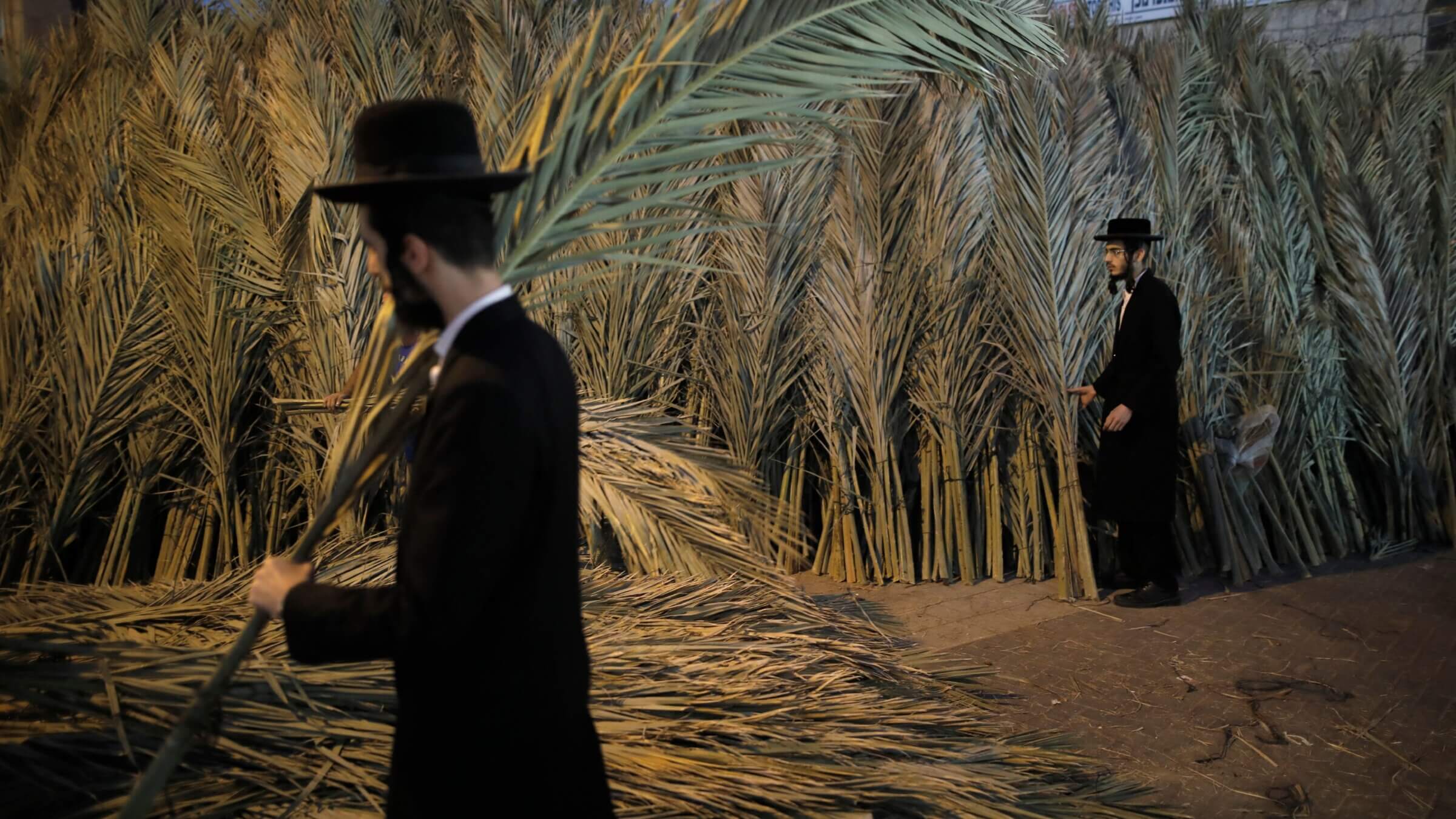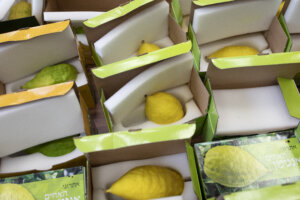Why Sukkot is my favorite Jewish holiday
Shaking a lulav, finding the most fragrant etrog, eating outside with no patriarchal judgment — what’s not to love?

A man carries palm branches for the roof of his Sukkah. Photo by Getty Images
Sukkot is my favorite Jewish holiday, especially because it comes right after my least favorite ones.
There’s a lot I love about Sukkot. First, there’s what there isn’t. Sukkot has almost no patriarchal theology, judgmental God imagery, militarism, or us-against-them stuff. There are no enemies or conflicts.
What there is, is joy, earth-based rituals, and a focus on the cycles of nature. This, in some circles, gets labeled as “paganism,” but it’s a central part of Judaism in general and the three pilgrimage festivals (Sukkot, Passover and Shavuot) in particular. Historically, these were agricultural festivals before they gained the mythic and theological meanings that were layered atop them. Sukkot is Chag Ha-Asif, the holiday of the end of the harvest; Pesach is Chag Ha-Aviv, the holiday of the spring (as well as an ancient lambing festival and celebration of grain); Shavuot is Chag Ha-Katzir and Chag Ha-Bikkurim, the holiday of the first harvest and first fruits.
But in modern times, especially for urban dwellers, Passover is mostly about the Exodus and Shavuot is about the Torah. Religions evolve.
Of course, there is a mythic-theological rationale for Sukkot as well: As Leviticus 23:42 explains, the Sukkah reminds us of how God sheltered the Children of Israel in the desert. But this is barely a rationale at all; it doesn’t commemorate a formative occasion, like the Exodus or Sinai. It’s more of an existential state.
And that rational pales in comparison to the radical, earth-based rituals that attend the holiday. My neo-pagan friends are always amazed when I tell them how we Jews gather our four sacred plants and wave them in the six directions, how we march in circles with them, even beating them on the ground at one point, and how all this culminates in a prayer for rain. Look who’s “neo-pagan” now!
More than pagan — shamanic, connecting humans, the natural world, magic, and the spiritual realm, which in this case might include the angels associated with the holiday, or the ancestors whose spirits are welcomed into the Sukkah as guests (ushpizin).

Sukkot is also a wonderful holiday in its contemporary contexts. In Israel, it’s vacation time — the perfect time of year between the heat of the summer and the rains of the winter. (Of course, the mass protests in Israel may change those plans this year.) And in America, Sukkot coincides with America’s many fall traditions, from the changing of the leaves to the much-maligned pumpkin spice phenomenon.
For all that, Sukkot is not nearly as widely observed as the holidays many of us just endured, Rosh Hashanah and Yom Kippur. There are many reasons for this, of course, from the importance of the New Year and Day of Atonement themselves, to the historical accidents that made them into the “High Holidays” of our day, notwithstanding their problematic theodicy and stultifying prayers.
This, I think, is a pity. Because Sukkot can be one of the best Jewish occasions of the year, for you, your family, and your friends. Here are a few suggestions.
First, build a sukkah, but keep things simple. You can buy a sukkah kit that snaps together in minutes, or improvise something personal and non-traditional, or, if you don’t have a sukkah, just eat meals outside, if weather permits. Don’t worry if it’s not sturdy; the fragility of the sukkah — its roof open to the sky, its temporary nature — is also a poignant embodiment of our own fragility as human beings.
Decorate your space with, well, anything, especially if you have kids: gourds, paper chains, leaves, wreaths, charts of the mystical ushpizin, whatever. (“It’s an activity,” my architect/activist friend Esther Sperber once told me regarding any Jewish crafting project.) Invite people over. Celebrate companionship and relationship. Have an I-Thou experience if you like, or just have lunch.
Most importantly, get yourself a lulav and etrog. There’s still time, especially if you’re in a large Jewish community; synagogues have them, and there are even wonderful markets where you (and, again, your kids if applicable) can select the most fragrant etrog, the best-shaking lulav. Shake that shamanic bundle of plants every day. There’s a halachically proper way to do it, which you can look up, but it’s the doing that matters, whether in synagogue, at home, or in your sukkah.
The ritual may feel awkward, even ridiculous. That’s fine. Follow the advice of the Israelites in Exodus 24:7: na’aseh v’nishmah, we will do and we will understand. (‘Shema’ literally means listen, but is often used to denote understanding.) Listen to the rustle of the palm fronds, smell the myrtle and citron. Let yourself feel what you feel — who knows what this ancient magic might unlock. Think about how thousands of years of ancestral Jewish earth-wisdom was somehow preserved, despite all the tendencies to the contrary, down to this very day. This is old magic of the old ways. We don’t have to understand it.
Of course, Jews like understanding things, so luckily there are a ton of new, innovative, and very earthy resources to help deepen your experience. Ayin Press has just put out a zine called “Indwelling: an Earth-Based Sukkot Companion,” which takes a radical, plant-focused, and often psychedelic perspective on the holiday. A bit more conventionally, MyJewishLearning has a clear and handy guide to the holiday and its observances. RitualWell offers a range of ritual and textual options that, I guarantee, will feel newer and fresher than that responsive reading on Yom Kippur. And that’s not even counting the font of resources (pun intended) about Shmini Atzeret and its many water rituals.
Of course, you don’t have to choose either the High Holidays or Sukkot; it’s both/and. So if you had an experience of catharsis and renewal this past week, I encourage you to build on it by taking up a Sukkot practice or two. Or, if it was a lot, the cooking and the cleaning and the praying, I encourage you to rest under the shade of the Sukkah and just … be. After all, Sukkot is largely about cycles, and the Jewish calendar itself is a cycle as well. I encourage you not to miss this turning.

















